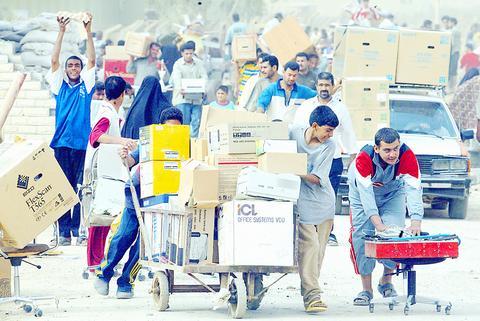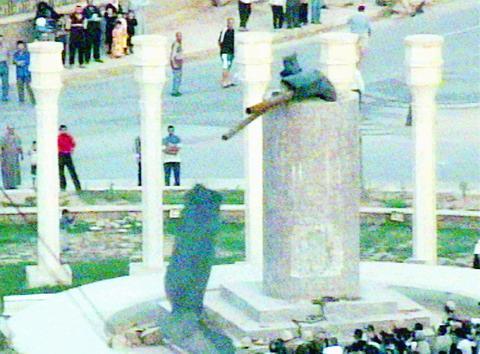US tanks and troops poured into the heart of Baghdad amid scenes of jubilation yesterday as Iraqi President Saddam Hussein's regime collapsed under a blistering three-week onslaught.
US forces met little Iraqi resistance as they took over swathes of the city, with looting erupting as it became clear that Saddam's 24-year stranglehold on the Iraqi people was disintegrating.
Tanks rolled into the heart of the city, with US soldiers helping jubilant Iraqis tear down a giant statue of Saddam in the Al-Fardus (Paradise) Square.

PHOTO: AP
They slung a thick rope noose around the Iraqi leader's neck, and controversially briefly draped the Stars and Stripes over his head.
Civilians queued up to hammer blow after blow into the plinth supporting the statue, while nearby soldiers chatted to journalists, the hatches of their tanks open, although other Marines on foot took up precautionary positions.
"The reception by the Iraqis was very warm and this was a big surprise to us. People are very nice," Staff Sergeant Daniel Attilio said.

PHOTO: REUTERS TV
US troops spread through the city to crush remaining pockets of resistance, facing snipers and isolated units prepared to make a last stand.
"Good, Good, Bush!" chanted cheering crowds in a northern district of Baghdad as a US Marine convoy passed by, as elsewhere angry crowds defaced and destroyed symbols of Saddam's regime.
US President George W. Bush was said by an administration official to be pleased with progress in the campaign, while Vice President Dick Cheney warned that "hard fighting" could lie ahead.
British Prime Minister Tony Blair, Washington's staunchest ally in the three-week-old war to wrench power from Saddam, warned: "This conflict is not, however, over yet."
Mystery still surrounds the fate of Saddam, who it is thought may try to make a last stand at his home-town of Tikrit north of Baghdad.
White House spokesman Ari Fleischer said Saddam had "missed his chance" to go peacefully into exile, hinting the administration believed the Iraqi leader still to be alive. "We still don't know his fate."
A spokesman for Blair said Iraq's command and control structure appeared to have broken down in Baghdad, adding that scenes of chaos and looting in the capital "tell their own story."
But he warned resistance to advancing US troops could still be quite "stubborn and fierce" after days of bloody fighting to wrest control of the capital of 5 million people, now largely deserted by pro-regime forces.
In the streets of Baghdad, people dared to utter the words "Traitor!" "Torturer!" "Dictator!" in reference to Saddam.
"We're ecstatic to get rid of him after all these years of war and deprivation," said Dinkha Khosina, joining hundreds of Iraqis to greet US troops racing from Baghdad's northern entrance to the heart of the capital.
"Welcome, welcome!" Baghdadis cried out in English, as young people took off their T-shirts and waved them in joy in front of the US soldiers.
"This is the greatest feeling I've had in my life, after spending 11 years in military service because of all the wars Saddam has put us through," said Ayub, who did not want his family name used.
In Saddam City, Baghdad's teeming Shiite suburb, people were seen breaking into shops and homes to steal furniture, food, electrical equipment and carpets.
In the north of the capital, citizens rampaged through the interior and irrigation ministries, gutting the offices, reporters said, while symbols of Saddam's iron grip on the country took the brunt of people's anger.
In other parts of the capital, Baghdadis tore up a giant portrait of Saddam, men brandished Kalashnikov rifles as they signalled their delight at the regime crumbling, while one white-haired man was seen laughing as he repeatedly hit at a poster of Saddam with a sandal.
City residents, hardened after almost 13 years of crippling economic sanctions, started looting symbols of Saddam's power, notably the irrigation and interior ministries and the headquarters of the Iraqi Olympic Committee, run by Saddam's elder son Uday.
US troops, moving up the eastern bank of the Tigris, approached the center of the capital, where they were expected to join units controlling the western side of the river, witnesses said.
Marines had seized Baghdad's eastern zone, though Iraqi snipers were still posing problems, a US military official said.
Allied warplanes still flew over the capital as smoke filled the skies, bringing air support to ground troops moving through the east and north of Baghdad where Iraqi forces had abandoned positions.
Dozens of Iraqi and Arab fighters in civilian clothing were still holed up behind buildings or in sandbagged positions on the western side of the Al-Jumhurya bridge spanning the river Tigris.
"Baghdad has not fallen and will never fall," said Mohammed al-Dahruj, a 24-year-old Syrian who volunteered to fight US-led forces.
At Sulaymaniya in the north of the country, streets erupted into a carnival atmosphere as tens of thousands of Kurds danced and sang at the news that US tanks controlled the center of Baghdad.
In southern Iraq, Basra was not yet totally under British control, Blair said.
"It is not secure for our troops yet, fully," he said. "[But it is] more under control today than it was yesterday."
Nothing has been heard from Saddam since a US bomber on Monday obliterated the building in Baghdad where he was believed to be with his two sons.
Major General Stanley McChrystal, with the US Joint Chiefs of Staff, said the air strike had been "very, very effective," but it was not known if the targets were still alive.
The Times of London said British intelligence believed Saddam had left the targeted building just before it was bombed.
The Washington Times quoted a US official as saying that US intelligence was "in a state of euphoria" because "there is no doubt he [Saddam] is dead."

AGING: As of last month, people aged 65 or older accounted for 20.06 percent of the total population and the number of couples who got married fell by 18,685 from 2024 Taiwan has surpassed South Korea as the country least willing to have children, with an annual crude birthrate of 4.62 per 1,000 people, Ministry of the Interior data showed yesterday. The nation was previously ranked the second-lowest country in terms of total fertility rate, or the average number of children a woman has in her lifetime. However, South Korea’s fertility rate began to recover from 2023, with total fertility rate rising from 0.72 and estimated to reach 0.82 to 0.85 by last year, and the crude birthrate projected at 6.7 per 1,000 people. Japan’s crude birthrate was projected to fall below six,

Conflict with Taiwan could leave China with “massive economic disruption, catastrophic military losses, significant social unrest, and devastating sanctions,” a US think tank said in a report released on Monday. The German Marshall Fund released a report titled If China Attacks Taiwan: The Consequences for China of “Minor Conflict” and “Major War” Scenarios. The report details the “massive” economic, military, social and international costs to China in the event of a minor conflict or major war with Taiwan, estimating that the Chinese People’s Liberation Army (PLA) could sustain losses of more than half of its active-duty ground forces, including 100,000 troops. Understanding Chinese

US President Donald Trump in an interview with the New York Times published on Thursday said that “it’s up to” Chinese President Xi Jinping (習近平) what China does on Taiwan, but that he would be “very unhappy” with a change in the “status quo.” “He [Xi] considers it to be a part of China, and that’s up to him what he’s going to be doing, but I’ve expressed to him that I would be very unhappy if he did that, and I don’t think he’ll do that. I hope he doesn’t do that,” Trump said. Trump made the comments in the context

SELF-DEFENSE: Tokyo has accelerated its spending goal and its defense minister said the nation needs to discuss whether it should develop nuclear-powered submarines China is ramping up objections to what it sees as Japan’s desire to acquire nuclear weapons, despite Tokyo’s longstanding renunciation of such arms, deepening another fissure in the two neighbors’ increasingly tense ties. In what appears to be a concerted effort, China’s foreign and defense ministries issued statements on Thursday condemning alleged remilitarism efforts by Tokyo. The remarks came as two of the country’s top think tanks jointly issued a 29-page report framing actions by “right-wing forces” in Japan as posing a “serious threat” to world peace. While that report did not define “right-wing forces,” the Chinese Ministry of Foreign Affairs was